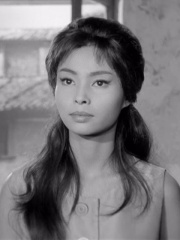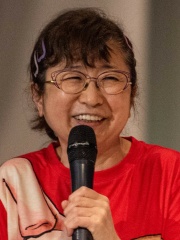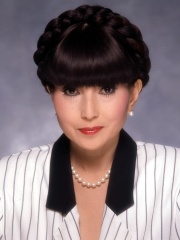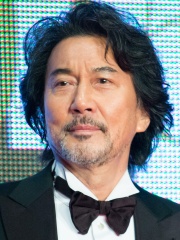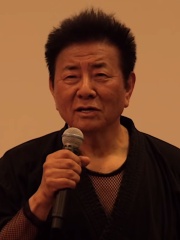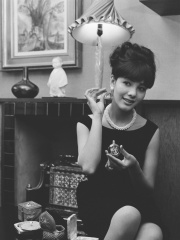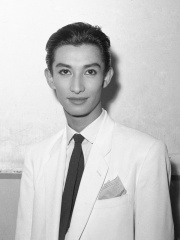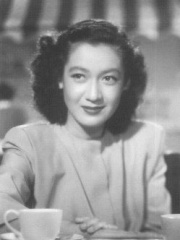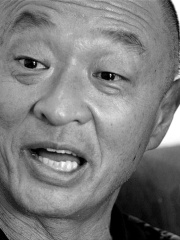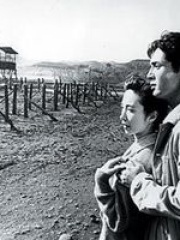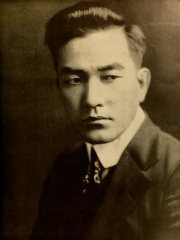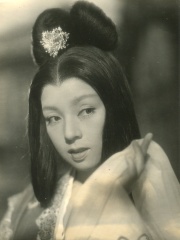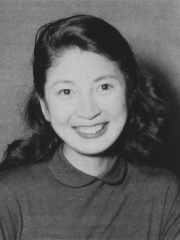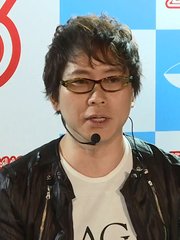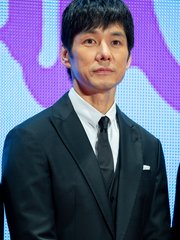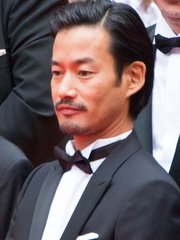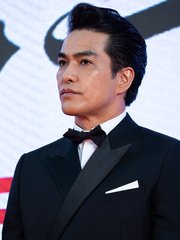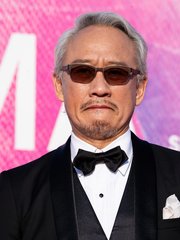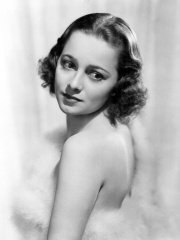
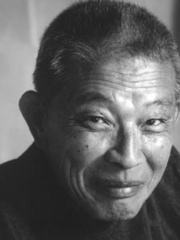

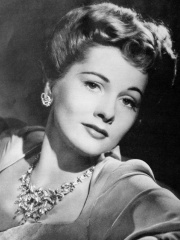
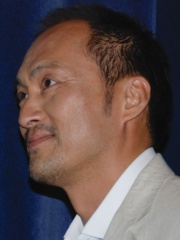
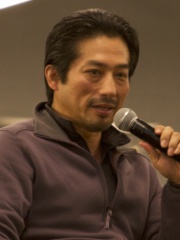
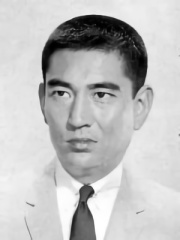
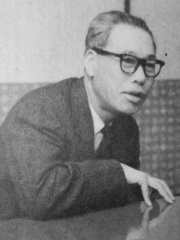
The Most Famous
ACTORS from Japan
This page contains a list of the greatest Japanese Actors. The pantheon dataset contains 13,578 Actors, 509 of which were born in Japan. This makes Japan the birth place of the 7th most number of Actors behind South Korea, and France.
Top 10
The following people are considered by Pantheon to be the top 10 most legendary Japanese Actors of all time. This list of famous Japanese Actors is sorted by HPI (Historical Popularity Index), a metric that aggregates information on a biography's online popularity. Visit the rankings page to view the entire list of Japanese Actors.

1. Olivia de Havilland (1916 - 2020)
With an HPI of 73.40, Olivia de Havilland is the most famous Japanese Actor. Her biography has been translated into 79 different languages on wikipedia.
Dame Olivia Mary de Havilland (; July 1, 1916 – July 26, 2020) was a British and American actress. The major works of her cinematic career spanned from 1935 to 1988. She appeared in 49 feature films and was one of the leading actresses of her time. Before her death in 2020 at age 104, she was the oldest living and earliest surviving Academy Award winner and was widely considered as being the last surviving major star from the Golden Age of Hollywood cinema. Her younger sister, with whom she had a noted rivalry which was well documented in the media, was Oscar-winning actress Joan Fontaine. De Havilland first came to prominence with Errol Flynn as a screen couple in adventure films such as Captain Blood (1935) and The Adventures of Robin Hood (1938). One of her best-known roles is that of Melanie Hamilton in Gone with the Wind (1939), for which she received the first of her five Oscar nominations, the only one for Best Supporting Actress. De Havilland departed from ingénue roles in the 1940s and later distinguished herself for performances in Hold Back the Dawn (1941), To Each His Own (1946), The Snake Pit (1948), and The Heiress (1949), receiving four Best Actress nominations and winning for To Each His Own and The Heiress. She was also successful in work on stage and television. De Havilland lived in Paris from the 1950s and received honors such as the National Medal of the Arts, the Légion d'honneur, and the appointment to Dame Commander of the Order of the British Empire at the age of 101. In addition to her film career, de Havilland continued her work in the theater, appearing three times on Broadway, in Romeo and Juliet (1951), Candida (1952), and A Gift of Time (1962). She also worked in television, appearing in the successful miniseries Roots: The Next Generations (1979), and Anastasia: The Mystery of Anna (1986) for which she received a Primetime Emmy Award nomination and won the Golden Globe Award for Best Supporting Actress in a Television Movie or Series. During her film career, de Havilland collected two New York Film Critics Circle Awards, the National Board of Review Award for Best Actress, and the Venice Film Festival Volpi Cup. For her contributions to the motion picture industry, she received a star on the Hollywood Walk of Fame. She and her sister remain the only siblings to have won major acting Academy Awards.

2. Mako (1933 - 2006)
With an HPI of 72.46, Mako is the 2nd most famous Japanese Actor. His biography has been translated into 36 different languages.
Makoto Iwamatsu (岩松 信, Iwamatsu Makoto; December 10, 1933 – July 21, 2006) was a Japanese-American actor, credited mononymously in almost all of his acting roles as simply Mako (マコ, MAH-koh). His career in film, on television, and on stage spanned five decades and 165 productions. He was an Academy Award, Golden Globe Award and Tony Award nominee. Born and raised in Kobe, Mako moved to the United States after the Second World War, where his dissident parents had moved to escape political persecution. After serving with the U.S. Army during the Korean War, he trained in acting at the Pasadena Playhouse and later co-founded the East West Players. His role as Po-Han (his second credited role on film) in the 1966 film The Sand Pebbles saw him nominated for the Academy Award and the Golden Globe Award for Best Supporting Actor. His other various roles included Kichijiro in the 1971 film adaptation of Silence, Oomiak "The Fearless One" in The Island at the Top of the World (1974), Akiro the Wizard in Conan the Barbarian (1982) and Conan the Destroyer (1984), and Kungo Tsarong in Seven Years in Tibet (1997). He was part of the original cast of Stephen Sondheim's 1976 Broadway musical Pacific Overtures, which earned him a Tony Award nomination for Best Actor in a Musical. Later in his career, he became well known for his voice-acting roles, including Mr. Yamaguchi in Rugrats in Paris: The Movie, Aku in the first four seasons of Samurai Jack (2001–04), and Iroh in the first two seasons of Avatar: The Last Airbender (2005–06). He died on July 21, 2006, at the age of 72 from esophageal cancer.

3. Liv Ullmann (b. 1938)
With an HPI of 71.12, Liv Ullmann is the 3rd most famous Japanese Actor. Her biography has been translated into 60 different languages.
Liv Johanne Ullmann (born 16 December 1938) is a Norwegian actress and filmmaker. Recognised as one of the greatest European actresses of all time, Ullmann is known as the muse and frequent collaborator of filmmaker Ingmar Bergman, whom she dated for five years. She acted in many of his films, including Persona (1966), Cries and Whispers (1972), Scenes from a Marriage (1973), The Passion of Anna (1969), and Autumn Sonata (1978). Ullmann won a Golden Globe Award for Best Actress – Motion Picture Drama in 1972 for the film The Emigrants and has been nominated for another four. In 2000, she was nominated for the Palme d'Or for her second directorial feature film, Faithless. She has received two BAFTA Award nominations, and two nominations for the Academy Award for Best Actress, for The Emigrants and Ingmar Bergman's Face to Face. On March 25, 2022, Ullmann was presented with an Honorary Academy Award in recognition of her "bravery and emotional transparency that has gifted audiences with deeply affecting screen portrayals".

4. Joan Fontaine (1917 - 2013)
With an HPI of 70.26, Joan Fontaine is the 4th most famous Japanese Actor. Her biography has been translated into 71 different languages.
Joan de Beauvoir de Havilland (October 22, 1917 – December 15, 2013), known professionally as Joan Fontaine, was a British-American actress best known for her roles in Hollywood films during the Golden Age of Hollywood. Fontaine appeared in more than 45 films in a career that spanned five decades. She was the younger sister of actress Olivia de Havilland. Their rivalry was well documented in the media at the height of Fontaine's career. Fontaine began her film career in 1935, signing a contract with RKO Pictures. Fontaine received her first major roles in The Man Who Found Himself (1937) and in Gunga Din (1939). Her career prospects improved greatly after her starring role in Alfred Hitchcock's Rebecca (1940), for which she received her first of three nominations for the Academy Award for Best Actress. The following year, she won that award for her role in Hitchcock's Suspicion (1941). A third nomination came with The Constant Nymph (1943). She appeared mostly in drama films through the 1940s, including Letter from an Unknown Woman and the comedy You Gotta Stay Happy (both 1948), which she co-produced with her second husband William Dozier through their film production company Rampart Productions. In the next decade, after her role in Ivanhoe (1952), her film career began to decline and she moved into stage, radio and television roles. She appeared in fewer films in the 1960s, which included Voyage to the Bottom of the Sea (1961), and her final film role in The Witches (1966), also known as The Devil's Own. She released an autobiography, No Bed of Roses, in 1978, and continued to act until 1994. Her Academy Award for Suspicion makes Fontaine the only actress to have won an Oscar for acting in a Hitchcock film. She and her sister Olivia remain the only siblings to have won lead-acting Academy Awards.
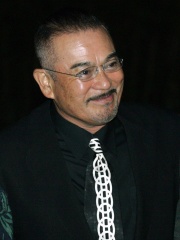
5. Sonny Chiba (1939 - 2021)
With an HPI of 69.25, Sonny Chiba is the 5th most famous Japanese Actor. His biography has been translated into 36 different languages.
Shinichi Chiba (Japanese: 千葉 真一, Hepburn: Chiba Shin'ichi; born Sadaho Maeda; 22 January 1939 – 19 August 2021) IPA: [tɕiꜜba ɕiɰ̃itɕi], known internationally as Sonny Chiba, was a Japanese actor and martial artist. Chiba was one of the first actors to achieve stardom through his skills in martial arts, initially in Japan and later to an international audience. Born in Fukuoka, Chiba played a variety of sports in high school, including baseball and volleyball. He also practiced gymnastics and participated at the National Sports Festival of Japan in his third year. When he was a university student, he learned martial arts, earning a black belt in Kyokushin Karate in 1965 and later receiving a fourth degree in 1984. Chiba's career began in the 1960s, when he starred in two tokusatsu superhero shows. In his first role, he replaced Susumu Wajima as the main character Kōtarō Ran/Seven Color Mask in Seven Color Mask (Nana-iro Kamen) in the second half of the series. However, his breakthrough role was in the 1974 film The Street Fighter. Before retiring, Chiba had also appeared in a number of English language American films, including Kill Bill: Volume 1 (2003) and The Fast and the Furious: Tokyo Drift (2006). Chiba died of COVID-19 complications at the hospital in Tokyo on 19 August 2021, at the age of 82.

6. Ken Watanabe (b. 1959)
With an HPI of 68.52, Ken Watanabe is the 6th most famous Japanese Actor. His biography has been translated into 51 different languages.
Ken Watanabe (渡辺 謙, Watanabe Ken; born October 21, 1959) is a Japanese actor. He is best known for playing tragic hero characters, such as General Tadamichi Kuribayashi in Letters from Iwo Jima and Lord Katsumoto Moritsugu in The Last Samurai, for which he was nominated for the Academy Award for Best Supporting Actor. Among other awards, Watanabe has won the Japan Academy Film Prize for Best Actor twice, in 2007 for Memories of Tomorrow and in 2010 for The Unbroken. He is also known for his roles in Christopher Nolan's films Batman Begins and Inception, as well as Memoirs of a Geisha, and Pokémon Detective Pikachu. In 2014, he starred in the reboot Godzilla as Dr. Ishiro Serizawa, a role he reprised in the sequel, Godzilla: King of the Monsters. He lent his voice to the fourth and fifth installments of the Transformers franchise respectively, Transformers: Age of Extinction and Transformers: The Last Knight, as Decepticon-turned-Autobot Drift. In 2022, he starred in the HBO Max crime drama series Tokyo Vice. He made his Broadway debut in April 2015 in Lincoln Center Theater's revival production of The King and I in the title role. In 2015, Watanabe received his first Tony Award nomination for Best Performance by a Leading Actor in a Musical at the 69th Tony Awards for his role as The King. He is the first Japanese actor to be nominated in this category. Watanabe reprised his role at the London Palladium in June 2018, earning a Laurence Olivier Award nomination.

7. Hiroyuki Sanada (b. 1960)
With an HPI of 68.18, Hiroyuki Sanada is the 7th most famous Japanese Actor. His biography has been translated into 39 different languages.
Hiroyuki Sanada (Japanese: 真田 広之; né Shimozawa; born 12 October 1960) is a Japanese actor. He has received numerous accolades, including a Golden Globe Award, two Primetime Emmy Awards, a British Academy Television Award, a Japan Academy Film Prize, two Hochi Film Awards, a Mainichi Film Award, three Blue Ribbon Awards for Best Actor, four Kinema Junpo Awards, and honors from the Yokohama Film Festival. In 2018, he received the Medal of Honor with Purple Ribbon from the Japanese government for his "artistic developments, improvements, and accomplishments", and in 2025, Time named him one of the 100 most influential people in the world. Sanada began his career in the mid-1960s at the age of five, and was the protégé of actor Sonny Chiba. A black belt in Kyokushin karate, he initially gained prominence for his roles in Japanese and Hong Kong action films, later establishing himself as a dramatic actor. He is best known to international audiences for his roles as Ryuji Takayama in Ring (1998) where he played alongside Nanako Matsushima, who was also his co-star in a 1997 television drama A Story of Love. His role as the Fool in a production of the Shakespeare play King Lear (1999–2000) gave him theatrical attention, and led to his appointment as an Honorary Member of the Order of the British Empire in 2002. Beginning in the 2000s, Sanada grew his Hollywood presence with such roles as Seibei Iguchi in The Twilight Samurai (2002), Ujio in The Last Samurai (2003), and Kenji in Rush Hour 3 (2007). Sanada's appearances in Hollywood films include Sunshine (2007), Speed Racer (2008), The Wolverine, 47 Ronin (both 2013), Minions (2015), Life (2017), Avengers: Endgame (2019), Army of the Dead (2021), as Hanzo Hasashi / Scorpion in Mortal Kombat (2021), in Bullet Train (2022), and John Wick: Chapter 4 (2023). He also had roles on Lost (2010) and the HBO series Westworld (2018–2020). Sanada gained awards for his role in the FX historical drama series Shōgun (2024) as Yoshii Toranaga, a fictionalized version of Tokugawa Ieyasu.

8. Ken Takakura (1931 - 2014)
With an HPI of 67.81, Ken Takakura is the 8th most famous Japanese Actor. His biography has been translated into 23 different languages.
Ken Takakura (Japanese: 高倉 健, Hepburn: Takakura Ken), born Takeichi Oda (小田 剛一, Oda Takeichi; February 16, 1931 – November 10, 2014), was a Japanese actor and singer who appeared in over 200 films. Affectionately referred to as "Ken-san" by audiences, he was best known for his brooding style and the stoic presence he brought to his roles. He won the Japan Academy Prize for Outstanding Performance by an Actor in a Leading Role four times, tied with Koji Yakusho for the most ever. Takakura additionally received the Japanese Medal of Honor with purple ribbon in 1998, the Person of Cultural Merit award in 2006, and the Order of Culture in 2013.

9. Takashi Shimura (1905 - 1982)
With an HPI of 67.35, Takashi Shimura is the 9th most famous Japanese Actor. His biography has been translated into 40 different languages.
Takashi Shimura (Japanese: 志村 喬, romanized: Shimura Takashi, born Shōji Shimazaki; March 12, 1905 – February 11, 1982) was a Japanese actor who appeared in over 200 films between 1934 and 1981. He appeared in 21 of Akira Kurosawa's 30 films (more than any other actor), including as a lead actor in Drunken Angel (1948), Rashomon (1950), Ikiru (1952) and Seven Samurai (1954). He played Professor Kyohei Yamane in Ishirō Honda's original Godzilla (1954) and its first sequel, Godzilla Raids Again (1955). In total, Shimura appeared in more than 300 film roles between 1934 and 1980. He was twice nominated for the BAFTA Award for Best Foreign Actor, and won the Mainichi Film Award for Best Actor in 1950. For his contributions to the arts, the Japanese government decorated Shimura with the Medal with Purple Ribbon in 1974 and the Order of the Rising Sun, 4th Class, Gold Rays with Rosette in 1980.

10. Victoria Principal (b. 1950)
With an HPI of 66.91, Victoria Principal is the 10th most famous Japanese Actor. Her biography has been translated into 37 different languages.
Vicki Ree Principal (born January 3, 1950), later known as Victoria Principal, is an American actress, producer, entrepreneur, and author, best known for her role as Pamela Barnes Ewing on the American primetime television soap opera Dallas. She spent nine years on the long-running series, leaving in 1987. Afterwards, she opened her own production company, Victoria Principal Productions, focusing mostly on television films. In the mid-1980s, she became interested in natural beauty therapies, and in 1989, she created an eponymous line of skincare products, Principal Secret. Principal became a best-selling author, writing three books about beauty, skincare, fitness, well-being, and health: The Body Principal (1983), The Beauty Principal (1984), and The Diet Principal (1987). In the 2000s, she wrote a fourth book, Living Principal (2001). She is also a two-time Golden Globe Award nominee.
People
Pantheon has 509 people classified as Japanese actors born between 1886 and 2004. Of these 509, 440 (86.44%) of them are still alive today. The most famous living Japanese actors include Liv Ullmann, Ken Watanabe, and Hiroyuki Sanada. The most famous deceased Japanese actors include Olivia de Havilland, Mako, and Joan Fontaine. As of April 2024, 127 new Japanese actors have been added to Pantheon including Atsuko Tanaka, Miho Nakayama, and Tomo Sakurai.
Living Japanese Actors
Go to all RankingsLiv Ullmann
1938 - Present
HPI: 71.12
Ken Watanabe
1959 - Present
HPI: 68.52
Hiroyuki Sanada
1960 - Present
HPI: 68.18
Victoria Principal
1950 - Present
HPI: 66.91
Masako Nozawa
1936 - Present
HPI: 63.84
Akiko Wakabayashi
1941 - Present
HPI: 62.45
Mayumi Tanaka
1955 - Present
HPI: 61.37
Tetsuko Kuroyanagi
1933 - Present
HPI: 61.23
Kōji Yakusho
1956 - Present
HPI: 61.10
Sho Kosugi
1948 - Present
HPI: 60.99
Mie Hama
1943 - Present
HPI: 60.64
Akihiro Miwa
1935 - Present
HPI: 60.61
Deceased Japanese Actors
Go to all RankingsOlivia de Havilland
1916 - 2020
HPI: 73.40
Mako
1933 - 2006
HPI: 72.46
Joan Fontaine
1917 - 2013
HPI: 70.26
Sonny Chiba
1939 - 2021
HPI: 69.25
Ken Takakura
1931 - 2014
HPI: 67.81
Takashi Shimura
1905 - 1982
HPI: 67.35
Setsuko Hara
1920 - 2015
HPI: 66.41
Cary-Hiroyuki Tagawa
1950 - 2025
HPI: 65.64
Tatsuya Nakadai
1932 - 2025
HPI: 65.15
Sessue Hayakawa
1886 - 1973
HPI: 64.86
Machiko Kyō
1924 - 2019
HPI: 63.49
Momoko Kōchi
1932 - 1998
HPI: 63.35
Newly Added Japanese Actors (2025)
Go to all RankingsAtsuko Tanaka
1962 - 2024
HPI: 55.59
Miho Nakayama
1970 - 2024
HPI: 53.81
Tomo Sakurai
1971 - 2025
HPI: 53.28
Yūki Amami
1967 - Present
HPI: 52.02
Tarako
1960 - 2024
HPI: 51.75
Ryōtarō Okiayu
1969 - Present
HPI: 51.60
Hidetoshi Nishijima
1971 - Present
HPI: 50.47
Yutaka Takenouchi
1971 - Present
HPI: 49.98
Kazuki Kitamura
1969 - Present
HPI: 49.55
Masahiko Nishimura
1960 - Present
HPI: 49.25
Kōji Yusa
1968 - Present
HPI: 49.14
Yasunori Matsumoto
1960 - Present
HPI: 48.95
Overlapping Lives
Which Actors were alive at the same time? This visualization shows the lifespans of the 25 most globally memorable Actors since 1700.


